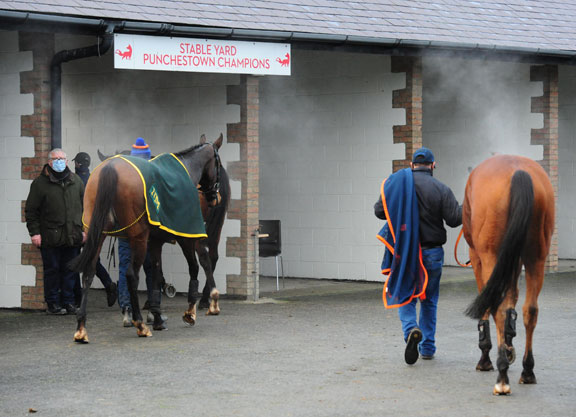The Irish Horseracing Regulatory Board can gain access to and test-by blood, hair or urine sample–every Thoroughbred in the country, on licensed or unlicensed premises, without notice after being granted Authorised Officer status by the Department of Agriculture, Food and the Marine.
The announcement was part of a wide range of new measures and funding unveiled on Friday as part of Irish racing's anti-doping strategy. These also include the announcement of the planned development of a whole-of-life Thoroughbred traceability system, including 30-day foal notifications; the issuing of e-passports, beginning with the 2021 foal crop; and funding for installation of CCTV cameras in the stable yards at every racecourse. The IHRB has, additionally, committed to increased transparency and consistency around reports into testing, and will release a twice-yearly activity report.
“Integrity around anti-doping is a top priority for the Irish racing and breeding industry,” said Brian Kavanagh, chief executive of Horse Racing Ireland. “People who set out to intentionally break the rules and use prohibited substances will be identified and prosecuted. They have no place in Ireland's world-renowned racing industry and all industry bodies are committed to zero tolerance in this area.”
“We know from the number of tests performed each year, and from the variety of testing methods used, that Ireland has a robust system which operates at or above agreed global standards,” Kavanagh continued. “Additionally, there is a stringent range of penalties that can be applied by the IHRB, which can go up to a lifetime ban for horses deliberately administered a substance prohibited at all times.
“In 2021, in excess of 4000 samples will be taken from racehorses in Ireland by the IHRB, and in the region of 25% will be out of competition tests or tests taken before horses come under the care of a licensed trainer. All samples are tested in an internationally accredited reference laboratory. In addition, approximately a further 600 samples will be taken from horses for sale at public auction.
“However, this is an area that we can never be complacent about and Horse Racing Ireland has been working with the IHRB to bring about further improvements to the systems this year. Our efforts and investment remain focused on ensuring that Ireland's €2-billion equine industry, an industry that employs thousands of people and encourages significant foreign direct investment, operates one of the most comprehensive systems of testing of any racing or breeding jurisdiction in the world. This is as it should be, given the importance of the industry and the value of trade in Irish horses.”
Denis Egan, chief executive of the Irish Horseracing Regulatory Board, said, “The Irish Horseracing Regulatory Board welcome the continuous support of Horse Racing Ireland and obviously share the goals of HRI, and everyone in the racing and breeding industry, to continue towards delivering a gold standard in equine anti-doping systems.
“Anti-doping never stands still. Our strategy has always been to take the right sample from the right horse at the right time. This has been one of the main drivers of a greater move towards out-of-competition testing, which in 2019 represented 18% of all samples taken–up from 7% in 2016. In percentage terms the total number of runners tested in Ireland–at 10%–is comparable to other jurisdictions.
“The appointment of IHRB officials as Authorised Officers will give the IHRB powers to access any Thoroughbred which is bred to race, at any time. No racing authority has greater powers when it comes to inspections and sampling, and this will further enhance our ability to deliver an equine anti-doping programme that is one of the best in the world.”
Not a subscriber? Click here to sign up for the daily PDF or alerts.






